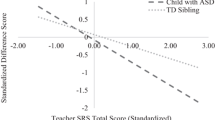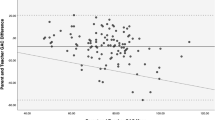Abstract
Although it is well known that informants often disagree about the degree of psychopathology in children, this issue has not been systematically evaluated in children with autism. The objective of this paper is to estimate the extent of agreement between parents and teachers on the assessment of autistic symptoms and adaptive behavior skills. We assessed 83 children, 4–6 years of age, with a diagnosis of pervasive developmental disorder (PDD), using the Autism Behavior Checklist (ABC) and the Vineland Adaptive Behavior Scales (VABS). Parents and teachers rated each child on each measure. While there was good agreement between informants on the VABS, teachers tended to rate the PDD children higher that parents. In contrast, there was virtually no agreement on the ABC. High levels of stress experienced by parents appeared to be associated with parents reporting more autistic behaviors and less adaptive skills than teachers. As with other child psychiatric disorders, caution must be exercised in combining information from several informants.
Similar content being viewed by others
References
Abidin, R. R. (1983).Parenting Stress Index Manual. Charlottesville, VA: Pediatric Psychology Press.
Achenbach, T. M., McConaughy, S. H., & Howell, C. T. (1987). Child/adolescent behavioral and emotional problems; Implications of cross-informant correlations for situational specificity.Psychological Bulletin, 101, 213–232.
American Psychiatric Association. (1989).Diagnostic and statistical manual of mental disorders (3rd ed., rev.). Washington, DC: Author.
Cicchetti, D. V., & Sparrow, S. S. (1989). Adaptive functioning at home and in the classroom (letter to the Editor)Journal of the American Academy of Child and Adolescent Psychiatry 28, 620–621.
Jensen, P. S., Taylor, J., Xenakis, S. N., & Davis, H. (1988). Child psychopathology rating scales and interrater agreement: I. Parent's gender and psychiatric symptoms.Journal of the American Academy of Child and Adolescent Psychiatry, 27, 442–450.
Krug, D. A., Arick, J., & Almond, P. (1980). Behavioral checklist for identifying severely handicapped individuals with high levels of autistic behavior.Journal of Child Psychology and Psychiatry, 21, 221–229.
Le Couteur, A., Rutter, M., Lord, C., Rios, P., Robertson, S., Holdgrater, M., & McLennan, J. D. (1989). Autism Diagnostic Interview.Journal of Autism and Developmental Disorders, 19, 363–388.
Levine, M. N. (1986).Arthur Adaption of the Leiter International Performance Scale: A handbook, Wooddale, Illinois: Western Psychological Services.
McCarthy, D. (1972).Manual for the McCarthy Scales of Children's Ability. New York: Psychological Corp.
Offord, D. R., Boyle, M. H., Szatmari, P., Rare-Grant, N. I., Links, P. S., Cadman, D. T., Byles, J. A., Crawford, J. W., Munroe Blum, H., Byrne, C., Thomas, H., Woodward, C. A. (1987). Ontario Child Health Study: Six-month prevalence of disorder and rates of service utilization.Archives of General Psychiatry, 44, 832–836.
Reynell, J., & Huntley, M. (1987).Reynell Developmental language Scales. Windsor, England, NFER.
Rutter, M., Tizard, J., & Whitmore, K. (1970).Education, health and behavior. London, Longmans.
Scackett, D. L., Haynes, R. B., & Tugwell, P. (1985).Clinical epidemiology: A basic science for medicine. Toronto: Little, Brown.
Sevin, J. A., Matson, J. L., Coc, D. A., Fee, V. E., & Sevin, B. M. (1991). A comparison and evaluation of three commonly used autism scales.Journal of Autism and Developmental Disorders, 21, 417–432.
Sparrow, S. S., Balla, D., & Cichhetti, D. (1984).Vineland Adaptive Behavior Scales (Survey Form). Circle Pines, MN: American Guidance Service.
Sturney, P., Matson, J. L., & Sevin, J. A. (1992). Analysis of the internal consistency of three autism scales.Journal of Autism and Developmental Disorders, 22, 321–328.
Szatmari, P. (1992a). A review of the DSM-III-R criteria for autistic disorder.Journal of Autism and Developmental Disorders, 22, 507–524.
Szatmari, P. (1992b). The validity of autistic spectrum disorders: A literature review.Journal of Autism and Developmental Disorders, 22, 583–600.
Teal, M. B., & Wiebe, M. J. (1986). A validity analysis of selected instruments used to assess autism.Journal of Autism and Developmental Disorders, 16, 485–494.
Thorndike, R. L., Hagan, E. P., & Sattler, J. M. (1986).Stanford-Binet Intelligence Scale (4th ed.), Chicago: Riverside.
Volkmar, F. R., Sparrow, S. S., Goudreau, D., Cichetti, D., Paul, R., & Cohen, D. J. (1987). Social deficits in autism: an operational approach using the Vineland Adaptive Behavior Scales.Journal of the American Academy of Child and Adolescent Psychiatry, 26: 156–161.
Volkmar, F. R., Cicchetti, D. V., Dykens, E., Sparrow, S. S., Leckman, J. F., & Cohen, D. J. (1988). An evaluation of the Autism Behavior Checklist.Journal of Autism and Developmental Disorders, 18, 81–98.
Wadden, N. P. K., Bryson, S. E., & Ridger, R. J. (1991). A closer look at the Autism Behavior Checklist: Discriminant validity and factor structure.Journal of Autism and Developmental Disorders, 21, 529–542.
World Health Organization. (1988).International classification and disease (10th ed. draft version). Clinical descriptions. Geneva, Switzerland: Author.
Author information
Authors and Affiliations
Additional information
This grant was supported by awards from the Ontario Mental Health Foundation, the Vellum foundation, and Health and Welfare Canada. The authors express their gratitude to the families and clinicians who participated in the project.
Rights and permissions
About this article
Cite this article
Szatmari, P., Archer, L., Fisman, S. et al. Parent and teacher agreement in the assessment of pervasive developmental disorders. J Autism Dev Disord 24, 703–717 (1994). https://doi.org/10.1007/BF02172281
Issue Date:
DOI: https://doi.org/10.1007/BF02172281




